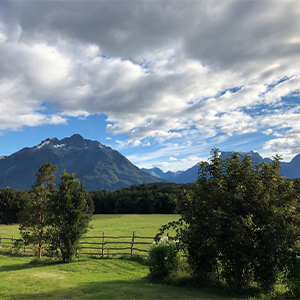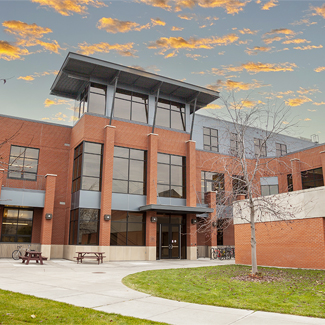Center for Natural Resources and Environmental Policy Promotes Collaborative Solutions for Pressing Environmental Conflicts

Water management. Biodiversity protection. Climate adaptation.
These are some of the most significant environmental issues facing the Rocky Mountain West, and they all share certain characteristics: coordination among multiple jurisdictions, involvement of policy and science, and they impact multiple stakeholders, including public, private and non-governmental actors. Long-term solutions to these key problems require collaborative approaches that draw on the expertise and input of many people, often with divergent interests.
The Blewett School of Law’s Center for Natural Resources and Environmental Policy (CNREP) is leading the way in tackling these critical issues. The CNREP addresses broad environmental issues directly through its project work while also training the next generation of collaborative environmental leaders through its innovative Natural Resources Conflict Resolution graduate certificate program.
Nationally recognized for their work in public lands policy, water law and policy, land-use planning and cross-boundary resource management, the CNREP’s expert team facilitates and mediates complex, multi-party dialogues on land, water and related issues. Their recent project work includes organizing and facilitating a ground-breaking effort to engage the 29 tribal nations in the lower Colorado River in water management issues in the basin, facilitating the 2019-2020 Montana Governor’s Grizzly Bear Advisory Council and conducting research on landscape scale governance practices in an effort to inform and provide recommendations to the steering committee of the Southeast Conservation Adaptation Strategy.
In addition to individual projects, CNREP staff serve in leadership roles for several professional networks focused on advancing collaborative solutions to a wide range of complex natural resource and environmental challenges. These networks include the Roundtable on the Crown of the Continent, California Landscape Stewardship Network, Western Collaborative Conservation Network, Network for Landscape Conservation and International Landscape Conservation Network.
CNREP also partners with the law school and the graduate school to offer the Natural Resources Conflict Resolution (NRCR) certificate program, the only graduate-level program in the nation specifically designed to provide students with a working knowledge of the theory and practice of collaboration and conflict resolution as applied to land use, natural resources, and environmental quality. The certificate program trains future leaders, drawing on CNREP’s expertise and the law school’s rich tradition of serving people through an emphasis on natural resources, environmental and Indian law.
“Students in the NRCR program include some of UM’s best students from across campus,” said Shawn Johnson, CNREP managing director and co-director of the NRCR certificate program. “They are universally driven by a desire to make a difference and know that they need knowledge and skills in collaboration and conflict resolution in order to make progress on today’s complex and often divisive natural resource and environmental issues.”
Johnson outlines his goal for the certificate as not only to provide students with the knowledge, skills and tools they are seeking but also to foster connections between students within the program so that they leave UM with a lifelong network of peers.
"I came to the University of Montana to learn how to bring people together to solve environmental issues,” said graduate student in environmental studies Travis Anklam. “Through the NRCR program's distinct place-based curricula and hands-on experiences facilitating collaborative conservation, I've been equipped with the skills needed to help communities across the West resolve natural resource conflicts."
"As a Native American person who is also an anthropologist,” said Dr. Ren Freeman, “I am keenly aware of the prevailing issues amidst the vast topic of management and use of tribal-based natural resources and the persistent conflicts. To address these issues and conflicts requires cross-cultural learning. Coursework, cohort meetings and practicum projects provide means to instruct and mentor students toward thoughtful and creative ways to observe, develop and engage facilitation strategies, meaningful professional relationships and employment that assists in promoting mutually beneficial outcomes."
Building on the training CNREP provides through their certificate program, the organization is now exploring directions in collaborative leadership. Over the past three years, CNREP has worked with the California Landscape Stewardship Network (CLSN), a statewide “network of networks” that emerged in late 2016 to help connect practitioners throughout California to explore shared challenges and opportunities.
One of the opportunities CLSN has identified is to develop a Collaborative Leadership program to equip and empower people with the knowledge, skills, and tools that are critical for collaborative, partnership-based approaches to be successful. As a leading applied research center and educational hub for the theory and practice of collaborative leadership, CNREP has been invited to play a leading role in developing this new Collaborative Leadership program.
The program is targeted primarily at early- and mid-career professionals from public, private and non-governmental fields who are increasingly working in diverse, multi-stakeholder partnerships but who have had little to no training or experience with collaboration. By focusing on the principles and practices of effective collaboration, the new Collaborative Leadership program will serve not only to enhance the efficacy of collaborative efforts tackling today’s most complex issues but also advance and promote collaboration as a vehicle for change.
To help advance this effort, the CLSN is making a multi-year investment in the work of the CNREP, including support for a new Fellow in Collaborative Leadership targeted at recent NRCR graduates.
 In August 2020, Devin Landry was named as the inaugural Fellow. In that role he provides coordinating and research support for the partners developing the Collaborative Leadership program.
In August 2020, Devin Landry was named as the inaugural Fellow. In that role he provides coordinating and research support for the partners developing the Collaborative Leadership program.
“The education I received from the program – understanding the value of a collaborative mindset and practicing the skills of conflict resolution and facilitation, as well as time spent in the field working with place-based conservation collaboratives – offered a wealth of knowledge and experience in how 21st-century conservation is practiced,” said Landry.
The competencies and skills that Landry learned through the NRCR program now drive his efforts to advance collaborative leadership for on-the-ground practitioners.
“Now working in support of landscape-scale conservation and stewardship, I continually see the need for conservationists of all stripes to learn and practice these same things” he said. “I’m grateful to have completed the NRCR program, and for the way it equipped me with the perspectives and skills that conservation collaboratives everywhere are seeking.”
For recent graduates of the NRCR program, the Collaborative Leadership Fellowship represents an exciting future direction to apply their skills and understanding to help landscape-scale conservation and stewardship practitioners achieve more durable outcomes for nature and people.
